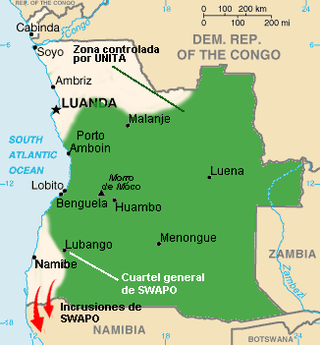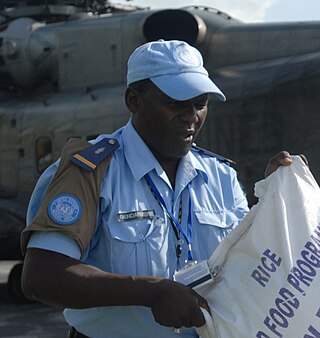
United Nations Security Council resolution 782, adopted unanimously on 13 October 1992, after welcoming the Rome General Peace Accords signed on 4 October 1992, in Rome between the FRELIMO (government) and RENAMO (rebel) parties in the Mozambican Civil War, the council approved the appointment of an interim Special Representative and the deployment of up to 25 military observers to Mozambique. The Special Representative was an Italian, Aldo Ajello.

United Nations Security Council resolution 797, adopted unanimously on 16 December 1992, after reaffirming Resolution 782 (1992), the Council decided to establish the United Nations Operation in Mozambique (ONUMOZ) as proposed by the Secretary-General Boutros Boutros-Ghali in line with the peace agreement for Mozambique.

United Nations Security Council resolution 818, adopted unanimously on 14 April 1993, after reaffirming resolutions 782 (1992) and 797 (1992) on the situation in Mozambique, the Council stressed its concern regarding the delays and difficulties affecting the implementation of the peace process envisaged in the Rome General Peace Accords during the Mozambican Civil War.

United Nations Security Council resolution 850, adopted unanimously on 9 July 1993, after reaffirming resolutions 782 (1992), 797 (1992) and 818 (1993) on the situation in Mozambique, the Council discussed the implementation of the Rome General Peace Accords and the formation of a new armed forces in the country.

United Nations Security Council resolution 851, adopted unanimously on 15 July 1993, after reaffirming resolutions 696 (1991), 747 (1992), 785 (1992), 793 (1992), 804 (1993), 811 (1993), 823 (1993) and 834 (1993), the Council noted the continuing deterioration of the situation in Angola and extended the mandate of the United Nations Angola Verification Mission II until 15 September 1993, discussing further the peace process in the country.

United Nations Security Council resolution 863, adopted unanimously on 13 September 1993, after reaffirming resolutions 782 (1992), 797 (1992), 818 (1993) and 850 (1993) on the situation in Mozambique, the council discussed the implementation of the Rome General Peace Accords.

United Nations Security Council resolution 867, adopted unanimously on 23 September 1993, after recalling resolutions 841 (1993), 861 (1993) and 862 (1993) on the situation in Haiti, the council reiterated its position of protecting international peace and stability and established the United Nations Mission in Haiti (UNMIH).

United Nations Security Council resolution 873, adopted unanimously on 13 October 1993, after recalling resolutions 841 (1993), 861 (1993), 862 (1993) and 867 (1993), the council noted the continued obstruction of the arrival of the United Nations Mission in Haiti (UNMIH) and the failure of the Armed Forces of Haiti to carry out their responsibilities and therefore reimposed international sanctions against Haiti that were previously suspended.

United Nations Security Council resolution 882, adopted unanimously on 5 November 1993, after reaffirming resolutions 782 (1992) and subsequent resolutions on Mozambique, the council noted, in addition to positive developments in the country, that some aspects of the Rome General Peace Accords had not been implemented.

United Nations Security Council resolution 892, adopted unanimously on 22 December 1993, after reaffirming resolutions 849 (1993), 854 (1993), 858 (1993), 876 (1993) and 881 (1993) on the Georgian–Abkhazian war and Resolution 868 (1993) concerning the safety of United Nations peacekeepers, the council discussed the phased deployment of 50 military observers in Georgia.

United Nations Security Council resolution 898, adopted unanimously on 23 February 1994, after reaffirming Resolution 782 (1992) and all subsequent resolutions on Mozambique, the Council discussed the implementation of the Rome General Peace Accords and established a 1,144 strong police component of the United Nations Operation in Mozambique (ONUMOZ).

United Nations Security Council resolution 901 was adopted unanimously on 4 March 1994. After reaffirming resolutions 849 (1993), 854 (1993), 858 (1993), 876 (1993), 881 (1993), 892 (1993) and 896 (1994), the council extended the mandate of the United Nations Observer Mission in Georgia (UNOMIG) until 31 March 1994.

United Nations Security Council resolution 905, adopted unanimously on 23 March 1994, after recalling resolutions 841 (1993), 861 (1993), 862 (1993), 867 (1993), 873 (1993) and 875 (1993), on the situation in Haiti, the council extended the mandate of the United Nations Mission in Haiti (UNMIH) until 30 June 1994.

United Nations Security Council resolution 922, adopted unanimously on 31 May 1994, after reaffirming Resolution 696 (1991) and all subsequent resolutions on Angola, the council discussed the peace process during the civil war and extended the mandate of the United Nations Angola Verification Mission II until 30 June 1994.

United Nations Security Council resolution 937, adopted on 21 July 1994, after reaffirming resolutions 849 (1993), 854 (1993), 858 (1993), 876 (1993), 881 (1993), 892 (1993), 896 (1994), 901 (1994), 906 (1994) and 934 (1994), the Council expanded the United Nations Observer Mission in Georgia (UNOMIG) to include co-operation with the Commonwealth of Independent States (CIS) and extended its mandate until 13 January 1995.
United Nations Security Council resolution 950, adopted unanimously on 21 October 1994, after reaffirming resolutions 813 (1993), 856 (1993), 866 (1993) and 911 (1994), the Council noted the deteriorating situation in Liberia and extended the mandate of the United Nations Observer Mission in Liberia (UNOMIL) until 13 January 1995.

United Nations Security Council resolution 961 was adopted unanimously on 23 November 1994, after recalling resolutions 637 (1989), 693 (1991), 714 (1991), 729 (1992), 784 (1992), 791 (1992), 832 (1993), 888 (1993) and 920 (1994), the council discussed the implementation of peace agreements in El Salvador and extended the mandate of the United Nations Observer Mission in El Salvador (ONUSAL) for a final time until 30 April 1995.

United Nations Security Council resolution 971, adopted unanimously on 12 January 1995, after reaffirming resolutions 849 (1993), 854 (1993), 858 (1993), 876 (1993), 881 (1993), 892 (1993), 896 (1994), 901 (1994), 906 (1994), 934 (1994) and 937 (1994), the Council extended the United Nations Observer Mission in Georgia (UNOMIG) until 15 May 1995.

United Nations Security Council resolution 972, adopted unanimously on 13 January 1995, after reaffirming resolutions 813 (1993), 856 (1993), 866 (1993), 911 (1994) and 950 (1994), the council discussed the peace process in Liberia and extended the mandate of the United Nations Observer Mission in Liberia (UNOMIL) until 13 April 1995.

United Nations Security Council resolution 1001, adopted unanimously on 30 June 1995, after reaffirming resolutions 813 (1993), 856 (1993), 866 (1993), 911 (1994), 950 (1994) and 972 (1995), and 985 (1995) on Liberia, the Council discussed the implementation of peace agreements in the country and extended the mandate of the United Nations Observer Mission in Liberia (UNOMIL) until 15 September 1995.



















